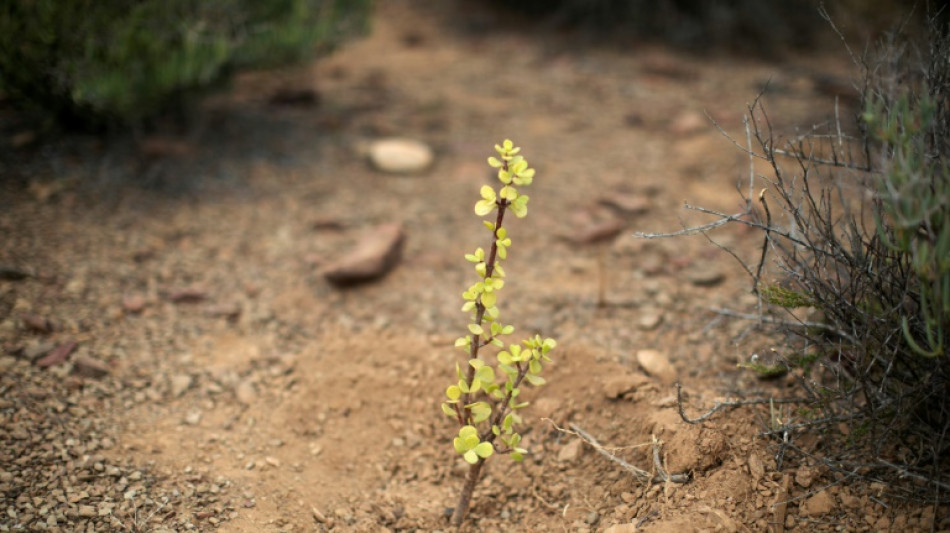
-
 Israeli president says 'we will overcome evil' at Bondi Beach
Israeli president says 'we will overcome evil' at Bondi Beach
-
Munsey leads Scotland to 207-4 against Italy at T20 World Cup

-
 Japan restarts world's biggest nuclear plant again
Japan restarts world's biggest nuclear plant again
-
Bangladesh poll rivals rally on final day of campaign

-
 Third impeachment case filed against Philippine VP Duterte
Third impeachment case filed against Philippine VP Duterte
-
Wallaby winger Nawaqanitawase heads to Japan

-
 Thailand's Anutin rides wave of nationalism to election victory
Thailand's Anutin rides wave of nationalism to election victory
-
Venezuela's Machado says ally kidnapped by armed men after his release

-
 Maye longs for do-over as record Super Bowl bid ends in misery
Maye longs for do-over as record Super Bowl bid ends in misery
-
Seahawks' Walker rushes to Super Bowl MVP honors

-
 Darnold basks in 'special journey' to Super Bowl glory
Darnold basks in 'special journey' to Super Bowl glory
-
Japan's Takaichi may struggle to soothe voters and markets

-
 Seahawks soar to Super Bowl win over Patriots
Seahawks soar to Super Bowl win over Patriots
-
'Want to go home': Indonesian crew abandoned off Africa demand wages

-
 Asian stocks track Wall St rally as Tokyo hits record on Takaichi win
Asian stocks track Wall St rally as Tokyo hits record on Takaichi win
-
Bad Bunny celebrates Puerto Rico in joyous Super Bowl halftime show

-
 Three prominent opposition figures released in Venezuela
Three prominent opposition figures released in Venezuela
-
Israeli president says 'we shall overcome this evil' at Bondi Beach

-
 'Flood' of disinformation ahead of Bangladesh election
'Flood' of disinformation ahead of Bangladesh election
-
Arguments to begin in key US social media addiction trial

-
 Agronomics Limited Announces Net Asset Value Calculation as at 31 December 2025
Agronomics Limited Announces Net Asset Value Calculation as at 31 December 2025
-
UK-Based Vesalic Limited Emerges from Stealth with Landmark Discovery of Potential Non-CNS Driver of Motor Neuron Diseases, including ALS, and Breakthrough Therapeutic and Diagnostic Opportunities

-
 Gotterup tops Matsuyama in playoff to win Phoenix Open
Gotterup tops Matsuyama in playoff to win Phoenix Open
-
New Zealand's Christchurch mosque killer appeals conviction

-
 Leonard's 41 leads Clippers over T-Wolves, Knicks cruise
Leonard's 41 leads Clippers over T-Wolves, Knicks cruise
-
Trump says China's Xi to visit US 'toward the end of the year'

-
 Real Madrid edge Valencia to stay on Barca's tail, Atletico slump
Real Madrid edge Valencia to stay on Barca's tail, Atletico slump
-
Malinin keeps USA golden in Olympic figure skating team event

-
 Lebanon building collapse toll rises to 9: civil defence
Lebanon building collapse toll rises to 9: civil defence
-
Real Madrid keep pressure on Barca with tight win at Valencia

-
 PSG trounce Marseille to move back top of Ligue 1
PSG trounce Marseille to move back top of Ligue 1
-
Hong Kong to sentence media mogul Jimmy Lai in national security trial

-
 Lillard will try to match record with third NBA 3-Point title
Lillard will try to match record with third NBA 3-Point title
-
Vonn breaks leg as crashes out in brutal end to Olympic dream

-
 Malinin enters the fray as Japan lead USA in Olympics team skating
Malinin enters the fray as Japan lead USA in Olympics team skating
-
Thailand's Anutin readies for coalition talks after election win

-
 Fans arrive for Patriots-Seahawks Super Bowl as politics swirl
Fans arrive for Patriots-Seahawks Super Bowl as politics swirl
-
'Send Help' repeats as N.America box office champ

-
 Japan close gap on USA in Winter Olympics team skating event
Japan close gap on USA in Winter Olympics team skating event
-
Liverpool improvement not reflected in results, says Slot

-
 Japan PM Takaichi basks in election triumph
Japan PM Takaichi basks in election triumph
-
Machado's close ally released in Venezuela

-
 Dimarco helps Inter to eight-point lead in Serie A
Dimarco helps Inter to eight-point lead in Serie A
-
Man City 'needed' to beat Liverpool to keep title race alive: Silva

-
 Czech snowboarder Maderova lands shock Olympic parallel giant slalom win
Czech snowboarder Maderova lands shock Olympic parallel giant slalom win
-
Man City fight back to end Anfield hoodoo and reel in Arsenal

-
 Diaz treble helps Bayern crush Hoffenheim and go six clear
Diaz treble helps Bayern crush Hoffenheim and go six clear
-
US astronaut to take her 3-year-old's cuddly rabbit into space

-
 Israeli president to honour Bondi Beach attack victims on Australia visit
Israeli president to honour Bondi Beach attack victims on Australia visit
-
Apologetic Turkish center Sengun replaces Shai as NBA All-Star


Spekboom bushes protect earth but can they cool Earth?
Andre Britz pulled over his pick-up truck on a rocky mountain track to show off the nature-preserving powers of southern Africa's spekboom shrub.
The 62-year-old Afrikaner is an evangelist for Portulacaria afra, a red-stemmed bush or small tree with thick, dense green leaves that acts as a sponge for carbon dioxide.
"Here you can see the difference between degraded land and what we call pristine spekboom veld," he said, pointing out a division running like a contour between lush green hilltop and arid valley side.
The plant once dominated the dry terrain of the Little Karoo in South Africa's Western Cape.
But decades of what Britz calls over-grazing and mismanagement have destroyed the shrub and the vital shade it offers the sun-scorched earth, not to mention its strength at absorbing carbon.
"The spekboom does carbon sequestration day and night. It is one of the few plants that do it," Britz told AFP on a tour to explain his ten-year-old mission.
"And the other thing is that it occurs here naturally," he said. "So that was why it was important to plant spekboom here and to have that secondary effect on the change of climate."
Ten years ago Britz founded Jobs 4 Carbon, an organisation dedicated to replanting and encouraging the spekboom in an area where farming was devastated by the long 2015-2020 drought.
Now he has a team of planters, labouring with shovels and picks in the rocky terrain to nurture new plants that could once more blanket the dry ground with lush green leaves.
- 'Miracle plant' -
Nearby, a two-year-old replanted Spekboom has begun to spread its branches above fresh shoots. Jobs 4 Carbon has already replanted almost 700 hectares (1,730 acres).
"It brings nature back to life," team leader Jan Cloete, 49, said with a smile.
To botanist Alastair Potts, 41, in its natural semi-arid ecosystem or "subtropical thicket", it is a "miracle plant".
It "creates forest-like micro-environments", a "carpet" of leaves that "trap water and dust and nutrients", as well as carbon, he said.
The latter is stored in large quantities because of the succulent's rare ability to swing between two types of photosynthesis.
In dry, hot weather, spekboom sucks carbon dioxide out of the atmosphere at night and stores it in the form of malic acid.
During the day, the plant closes its pores, called stomata, to minimise water loss and uses its night stash for photosynthesis.
This greatly boosts its sequestration capacity.
Fact-checkers have debunked overenthusiastic claims that the plant rivals the Amazon rainforest in terms of carbon absorption, but proponents say it still pulls above its weight when allowed to grow in its natural environment.
A 2006 paper estimated that one hectare of spekboom sequestered on average four tonnes of CO2 per year. Others put the figure at more than 15 tonnes.
- Carbon credits -
Jobs 4 Carbon is hoping to plant more of it and fund the venture selling carbon credits, a financial instrument bought by companies to offset their greenhouse gas emissions.
To make that viable, however, scientists first have to agree on just how much CO2 the little succulent exactly sequesters.
Still, Potts is optimistic. Spekboom doesn't have the drawbacks of other tree-planting projects criticised for setting up monocultures in unsuitable ecosystems, he said.
And by restoring the environment, it helps prevent emissions from land degradation.
"I feel that carbon farming and spekboom is the perfect mix," he said.
"We're changing the ecosystem functioning back to what it was, through carbon, which is fantastic."
With funding from international foundations and private companies, Jobs 4 Carbon is looking to green 13,000 hectares across the region, said Andre Britz.
But much more could be done across the country, according to Potts.
The group currently plants the shrub for free if landowners agree to leave their plot fallow for at least 15 years in return.
In the courtyard of his village church, 15,000 small plants are ready to put down roots in the arid ground, which reminds him of an old saying he heard from his grandfather: "Take care of your veld, and your veld will take care of you".
X.Karnes--AMWN


